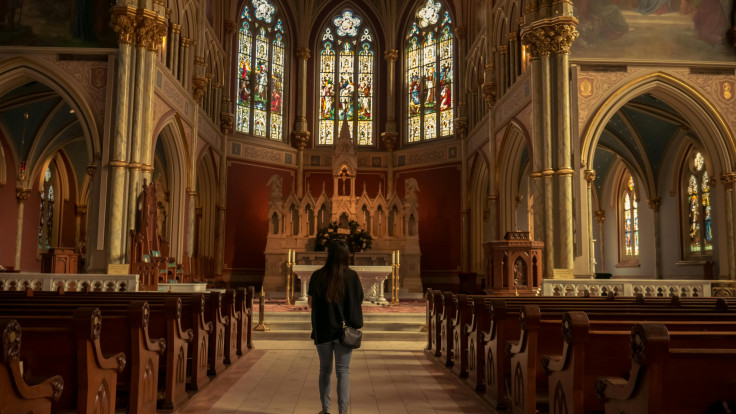What Is Opus Dei and Why Are 43 Argentinian Women Suing The Secretive Catholic Group
The name Opus Dei literally translates to 'Work of God' in Latin, reflecting its followers' beliefs.

When Claudia Carrero was 13, she was promised an education and a chance to travel the world working in hospitality. Instead, she was delivered into what she now describes as a life of modern slavery under Opus Dei, a conservative Catholic organisation with deep roots across Latin America. Now aged 58, Carrero is among 43 women who have filed a historic lawsuit accusing Opus Dei of exploitation, trafficking, and systemic abuse that spanned decades.
Their harrowing testimonies expose what they claim is a decades-long pattern of coercion, unpaid labour, isolation and religious manipulation—all hidden behind the façade of spiritual vocation.
Allegations of Forced Labour and Psychological Abuse
The women, many from poor families in Argentina, allege they were recruited as children and teenagers under the guise of joining 'vocational schools' or religious institutions that promised them an education and future opportunities. Instead, they were made to work up to 12 hours a day as unpaid domestic servants, catering to elite Opus Dei members while receiving little to no schooling.
Their lawyer, Sebastián Sal, argues these institutions systematically exploited vulnerable girls. 'They tried to keep them like little children,' Sal said, describing how the girls' communication was severely restricted. They were permitted just one letter and one phone call per month. Their reading material was limited to children's books and religious texts.
'They justify all of this by saying it is a "decision from God",' Sal explained. He is now spearheading legal action against Opus Dei and its leaders in South America, following a two-year investigation by federal prosecutors.
Prosecutors allege that between 1972 and 2015, senior figures within the group trafficked young girls across the region, deliberately targeting families in financial hardship. The case is now awaiting a judge's decision on whether it will proceed to trial.
Who Are Opus Dei?
Founded in Spain in 1928 by priest Josemaría Escrivá, Opus Dei is one of the most secretive and powerful arms of the Catholic Church. Officially known as the Prelature of the Holy Cross and Opus Dei, it is the only personal prelature in the Church, operating independently of diocesan boundaries.
Opus Dei claims that its mission is to help people find God through their everyday lives. Critics, however, say the group's rigid control over members and its advocacy for self-flagellation, celibacy, and total obedience amounts to cult-like behaviour.
The group operates in over 70 countries, with Vatican records showing 93,510 members as of 2021, including 2,115 priests and 91,395 laypeople. Despite its relatively small numbers, Opus Dei holds significant sway within the Vatican and has long been accused of influencing Church doctrine and political policy behind closed doors.
The Survivors Speak Out
Andrea Martínez, one of the claimants, joined Opus Dei in 1989 at the age of 12, dreaming of becoming a psychologist. Instead, she was taken away from her home, forced to cook and clean for senior members, and subjected to physical punishments.
'They treated me like a slave, without any capacity to think or act or do,' Martínez told The Guardian.
Her schooling was limited to just three hours a day. By the time she turned 16, she had been given a cilice—a spiked chain used for self-punishment—and a whip. She was made a numerary assistant, a role involving celibacy, domestic servitude, and obedience to senior clergy.
'We were told, always, to be obedient and docile,' Martínez said. 'From the very beginning, I was told that I couldn't say anything about Opus Dei, or what was happening, to my parents.'
Carrero, taken in 1979, tells a similar story. She says Opus Dei targeted her family precisely because they were 'quiet, religious people' struggling financially. 'I was excited. But they did not take me there to study, but to work,' she said in an interview.
Both women say they were eventually discarded—left with no money, qualifications, or support.
A Legal Battle With Global Implications
Sal told cult expert Dr Steven Hassan in an interview that he believes Opus Dei's operations extend far beyond Argentina. He suspects there are victims in the United States and other countries who have yet to come forward.
'These guys from Opus Dei offer these women a new and better life,' Sal said. 'But instead of that, they create a kind of state of slavery.'
Dr Hassan concurred, stating that the group's actions likely amount to labour trafficking under international law: exploitation secured by fraud, force, or coercion.
Despite Opus Dei's firm denial of the allegations, the organisation's controversial legacy is once again under intense scrutiny. A spokesperson has said the accusations have been 'completely taken out of context', yet they have offered no comment on whether reparations will be made to the women involved.
A Call for Justice and Accountability
The stories emerging from Argentina highlight the urgent need for oversight and reform within religious institutions. What began as a promise of education for vulnerable girls ended in years of unpaid labour, psychological trauma, and isolation.
As the court deliberates whether the case should proceed to trial, survivors like Martínez and Carrero continue to speak out, hoping their courage will pave the way for others to come forward.
The case has already sparked conversations globally about faith, coercion, and abuse of power. It remains to be seen whether the Catholic Church and Opus Dei will be held accountable. But for now, the survivors' message is clear: justice, dignity, and human rights are worth fighting for—no matter how long it takes.
© Copyright IBTimes 2025. All rights reserved.






















